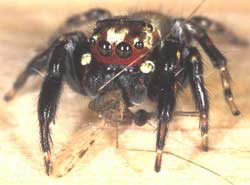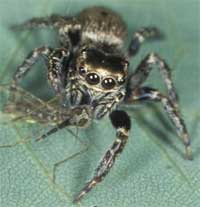The bloodthirsty spider species in Africa
Like the imaginative character Dracula and the real blood-sucking bat, these jumping spiders in eastern Africa also crave human blood.
 The spiders, Evarcha culicivora, are unable to penetrate the skin and suck blood, so they indirectly absorb human blood by selecting the infected female's mosquitoes.
The spiders, Evarcha culicivora, are unable to penetrate the skin and suck blood, so they indirectly absorb human blood by selecting the infected female's mosquitoes.
This bloodthirsty spider is the first known predator to choose bait based on what the prey eats. Blood is a nutrient-rich beverage that can be absorbed easily. " Perhaps the blood is a nutritious, readily available liquid meal that consumes the least amount of energy ," said Ximena Nelson, author of the study.
Nelson, a scientist at Macquarie University in Australia, and his team conducted an experiment on Evarcha culicivora . They first placed the spider in a small glass jar so that the animal could not distinguish the smell of the prey - including the male mosquito who did not suck the blood, the female mosquito drinking the sugar and the female sucking the blood.

Evarcha culicivora with his "meal"
Just looking with the eyes, the spider always chooses the females that stretch themselves because of the blood - looking plump and red .
Next, the researchers pumped the mosquito's smell into the spider's habitat. The spider only uses its weak sense of smell to pick the right female mosquito that sucked blood.
Nelson said blood sucking is a dangerous activity, so the spider knew how to reduce the danger.
" The bitten objects will have bouncing reflexes, like people use their hands, and animals use their tails - so usually an insect will die, " Nelson explained. " Maybe spider Ararcha will be safer when it comes to blood by killing mosquitoes, even if it is reacted, it is not as dangerous ."
The spider also uses a clever method to catch big female mosquitoes. He stalked a mosquito like a cat, and jumped up or poked out under the mosquito, before biting it.
MT ( according to Discovery )
- how does the bloodthirsty spider choose moof?
- Find out that spiders know to ride prey waves like old water gods
- Recreate the 410 million-year-old spider's walking
- There is a species of spider that makes all species admire in the Amazon
- Discovered nine new colorful fur spiders in Brazil
- How did the spider 'invade' the Earth?
- The robot spider can bend and bend like a desert spider in Africa
- Giant spider revives in England
- Startled at 5 giant spider species in the world
- Searching for traces of giant spider monsters eating humans in ancient times
- One time reporter is up to 25m long, super spider is real?
- Three new spider species were discovered in Phong Nha - Ke Bang
 Animal 'suffering' after hibernation
Animal 'suffering' after hibernation Why do goats climb well?
Why do goats climb well? Scientists were surprised to see chimpanzees eating turtles
Scientists were surprised to see chimpanzees eating turtles Giant catfish died deadly due to drought in Thailand
Giant catfish died deadly due to drought in Thailand